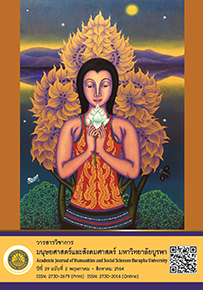The Participatory Action Research of Community Empowerment in Aeko-Saenkumlue Village, Using the Contemplation-Oriented Transformative Facilitation
Main Article Content
Abstract
This research’s objectives were to study the contemplation-oriented transformative facilitation appropriate for the community empowerment in Aeko-Saenkumlue and to explicate the participants’ inner and outer changes found after the completion of learning program. It employed Participatory Action Research as its methodology while centered on the project-based learning with cooperative manner in all steps. The results revealed that the praxis of effective transformative facilitation consisted of co-created intent of doing common good with the addition of trust, intimacy, contextual knowing, supplementary skills both inner and outer, group empowerment with empathy, cooperation, inspiration, supports of mentorship, recognition, and faith in leadership. Meanwhile, the inner changes found in the participants were those regarding mindfulness, betterment in relationships, and confidence in self-potentials while outer skills found were aptness in decision making, duty balancing, and new understandings in ancient wisdom and cultural ecology. Nevertheless, the alteration of one’s own meaning perspective is considered as an essential transformation as well.
Downloads
Article Details
บทความทุกบทความเป็นลิขสิทธิ์ของวารสารวิชาการมนุษยศาสตร์และสังคมศาสตร์ มหาวิทยาลัยบูรพาเท่านั้น
References
เกษราวัลณ์ นิลวรางกูร. (2556). การวิจัยเชิงปฏิบัติการและการวิจัยเชิงปฏิบัติการอย่างมีส่วนร่วม: ความเป็นมาและความเชื่อมโยง. วารสารสมาคมพยาบาลฯ สาขาภาคตะวันออกเฉียงเหนือ, 31(3), 23-28.
จินตนา สุจจานันท์. (2554). การศึกษาตลอดชีวิตและการพัฒนาชุมชน. กรุงเทพฯ: โอเดียนสโตร์.
ชลลดา ทองทวี, จิรัฐกาล พงศ์ภคเธียร, ธีระพล เต็มอุดม, พงษธร ตันติฤทธิศักดิ์ และสรยุทธ รัตนพจนารถ. (2551). จิตตปัญญาพฤกษา: การสำรวจและสังเคราะห์ความรู้จิตตปัญญาศึกษาเบื้องต้น. นครปฐม: โครงการวิจัยและจัดการความรู้จิตตปัญญาศึกษา สำนักงานกองทุนสนับสนุนการสร้างเสริมสุขภาพ และศูนย์จิตตปัญญาศึกษา มหาวิทยาลัยมหิดล.
ธีระภัทรา เอกผาชัยสวัสดิ์. (2554). ชุมชนศึกษา (พิมพ์ครั้งที่ 2). กรุงเทพฯ: สำนักพิมพ์แห่งจุฬาลงกรณ์มหาวิทยาลัย.
วรรณดี สุทธินรากร. (2560). การวิจัยเชิงปฏิบัติการแบบมีส่วนร่วมและกระบวนการทางสำนึก. กรุงเทพฯ: สยามปริทัศน์.
สมสิทธิ์ อัสดรนิธี. (2554). ญาณวิทยาของจิตตปัญญาศึกษาในประเทศไทย. วิทยานิพนธ์ศิลปศาสตรมหาบัณฑิต, สาขาวิชาจิตตปัญญาศึกษาและการเรียนรู้สู่การเปลี่ยนแปลง, บัณฑิตวิทยาลัย, มหาวิทยาลัยมหิดล.
สมสิทธิ์ อัสดรนิธี และกาญจนา ภูครองนาค. (2560). การศึกษาวิเคราะห์ความรู้เกี่ยวกับการเรียนรู้สู่การเปลี่ยนแปลงตามแนวจิตตปัญญาศึกษาเพื่อการบ่มเพาะความซื่อตรง. วารสารวิชาการศึกษาศาสตร์ คณะศึกษาศาสตร์ มหาวิทยาลัยศรีนครินทรวิโรฒ, 18(2), 225-242.
สมสิทธิ์ อัสดรนิธี และคณะ. (2556). กระบวนการเรียนรู้สู่การเปลี่ยนแปลงแนวจิตตปัญญาศึกษาเพื่อนำไปสู่ความสามัคคีกลมเกลียวของส่วนรวม: กรณีศึกษาหมู่บ้าน แอโก๋-แสนคำลือ อำเภอปางมะผ้า จังหวัดแม่ฮ่องสอน. นครปฐม: คณะกรรมาธิการการศาสนา คุณธรรม จริยธรรม ศิลปะ และวัฒนธรรม วุฒิสภา และมหาวิทยาลัยมหิดล. (เอกสารไม่ตีพิมพ์).
สมสิทธิ์ อัสดรนิธี และคณะ. (2558). การบ่มเพาะผู้นำการเปลี่ยนแปลงรุ่นใหม่ของชุมชนแอโก๋-แสนคำลือด้วยกระบวนการเรียนรู้สู่การเปลี่ยนแปลงแนวจิตตปัญญาศึกษา. กรุงเทพฯ: คณะกรรมาธิการการศาสนา คุณธรรม จริยธรรม ศิลปะ และวัฒนธรรม วุฒิสภา และสำนักงานกองทุนสนับสนุนการสร้างเสริมสุขภาพ. (เอกสารไม่ตีพิมพ์).
อุทัย ปริญญาสุทธินันท์. (2561). การพัฒนาชุมชน: แนวคิดและทฤษฎีการพัฒนา ประเด็นปัจจุบันและกรณีศึกษา. กรุงเทพฯ: สำนักพิมพ์แห่งจุฬาลงกรณ์มหาวิทยาลัย.
Kegan, R. (1982). The evolving self: Problem and process in human development. Cambridge, MA: Harvard University Press.
O’Sullivan, E. (2002). The project and vision of transformative education: Integral transformative learning. In E. O’Sullivan, A. Morrell, & M. A. O’Connor (Eds.). Expanding the boundaries of transformative learning: Essays on theory and praxis (pp. 1-12). New York: Palgrave.


